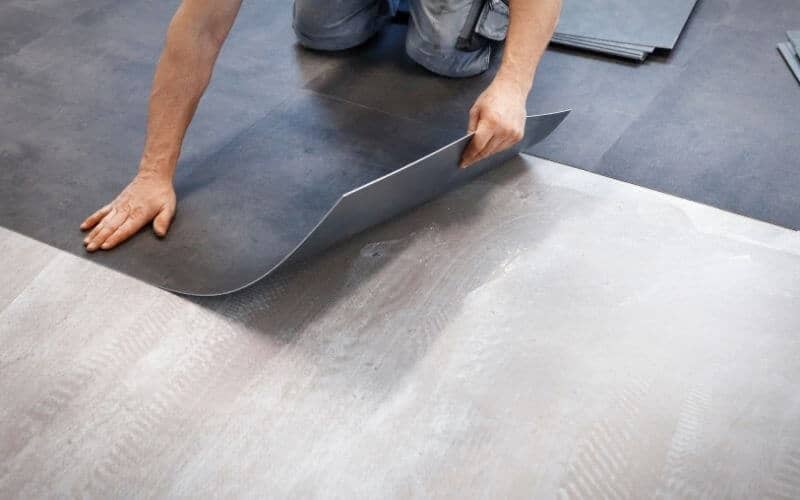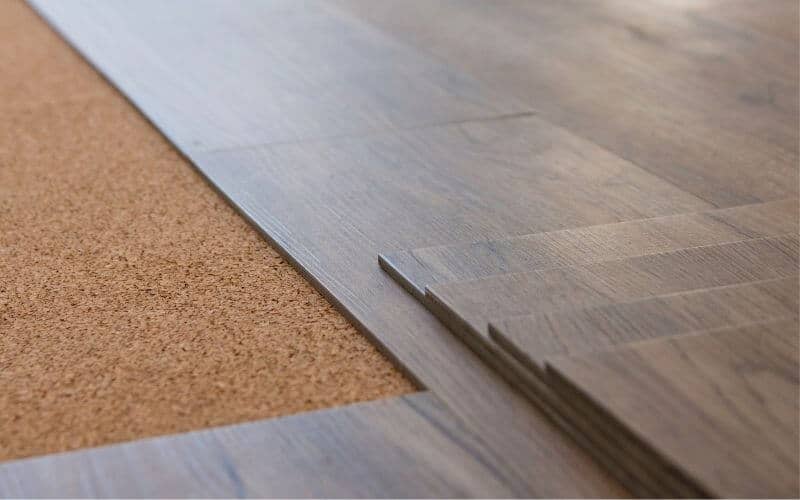When looking at recommendations for top flooring options for your homes and even commercial places, it is normal to come across the vinyl floor option. Asides
from being water-resistant, they’re also quite durable and have a nice finished look, but one vital aspect we tend to overlook is the heat factor.
This leads us to the question, is vinyl heat resistant?
One thing you must understand is that virtually every flooring material exposed to extreme heat will suffer damage, with vinyl inclusive.
The vinyl flooring is quite a popular figure when it comes to top flooring options, it boasts of great features, and its only obvious drawback being its susceptibility to scuffs, melting, and permanent discoloration when exposed to heat which isn’t bad at all given you aren’t planning to install it in a fiery furnace, are you?
Related: Pros and cons of vinyl flooring
Is Vinyl Heat Resistant?
Table of Contents
Definitely not! Vinyl isn’t heat resistant. This is due to the materials used in making them; polyvinyl chloride (PVC.) being the base material that has a very low thermal stability. This is why exposing vinyl to heat beyond its temperature resistance level will damage it.
However, if you’re wondering how much heat is just about enough for your vinyl floor, a temperature within 65-85 degrees is recommended.
Read: How to fix vinyl floor buckling
Sources of Heat that can Damage Vinyl
This may sound quite pointless trying to explain heat sources that could damage your vinyl flooring since you aren’t exposing it to extreme heat, but you don’t necessarily need to expose the vinyl floor to a vaporizer before it gets damaged.
Everyday activities like placing hot pans on vinyl can do just enough damage on your vinyl floor. Here are other heat sources that pose a threat to your vinyl floor.
Cigarette
Wrongly disposing of lit cigarette sticks would harm just about anything, from carpets, clothing materials to your vinyl flooring. Again, this could be unintentional and unnoticed until you start seeing scuffs and melting on your vinyl floor.
Lit match
After you lit a match stick, always dispose of them properly and avoid dropping them on your vinyl floor, as this will do just enough harm as exposing your vinyl floor to a flame of fire.
Clothes Iron
Speaking of throwing a lit match stick on your vinyl floor, clothes irons cause just enough harm too. Placing a steaming hot iron directly on your vinyl flooring will leave a very nasty impression on your floor.
After ironing, it is advisable to let it sit until it cools off properly before laying them down.
To further add, do not place the iron directly on a cloth material over your vinyl flooring; instead, always utilize a quality ironing board, as this will prevent direct contact with your floors and also provide protection from excessive heat.
Read: How to cut vinyl floor tiles
Curling Iron
Let’s face it, having the nice curls, and wavy texture on our hair looks good, but you should follow proper safety measures so you don’t end up destroying your vinyl floor. After using a curling iron, putting it away safely should be your top priority.
Tipped Candle
When dealing with candles at home with a vinyl floor, you should be very cautious amid following candle safety measures, as a tipped candle can cause great damage to your newly installed vinyl flooring.
In order to avoid this, always utilize non-flammable materials to set up your candlesticks. A non-flammable hurricane glass should do the trick.
Also, always set the candle above the floor so you easily have a clear vision of where it is to avoid tipping it over your vinyl floor.
Direct Contact With Sunlight
Installing a vinyl floor in places directly exposed to sunlight may damage your floor in the long run. When picking flooring options for different areas in your house, always save the vinyl flooring options for places that don’t have direct contact with sunlight, as the UV rays from sunlight can damage your floor.
Related: How to repair scratch on vinyl floor
Conclusion
The vinyl flooring option is always a great pick for homes and commercial areas considering its durability and superior resistance to wears and tears.
is vinyl heat resistant? No to ensure your newly installed vinyl floor lives through its lifespan unscathed, you should avoid direct heat exposure as this will damage your floor thereby leaving a nasty impression.

